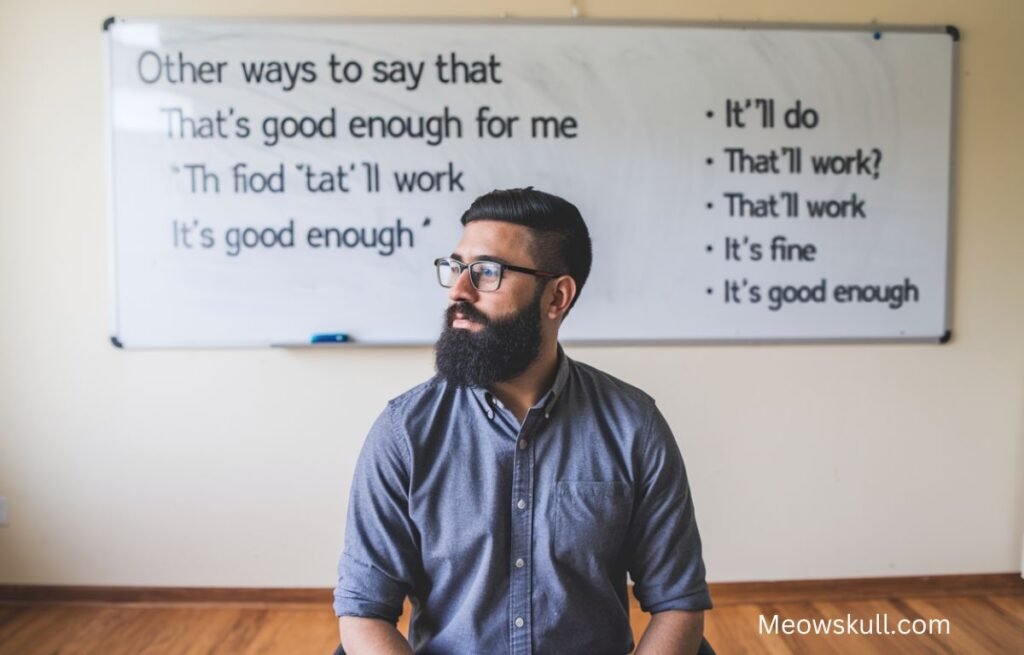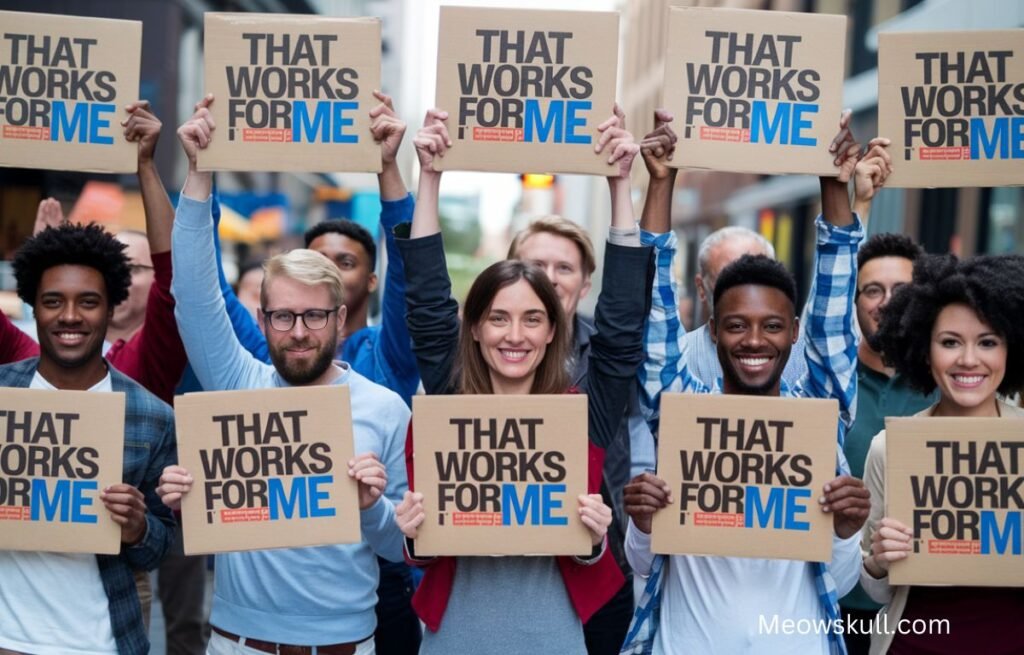In any conversation, whether it’s in the workplace, with friends, or during negotiations, the phrase “that works for me” is often used to express agreement or acceptance. However, repeating the same phrase can sometimes make your responses seem monotonous. Expanding your vocabulary not only enhances your communication skills but also allows you to convey your thoughts more precisely. In this article, we’ll explore 18 different ways to say “that works for me” to help you diversify your language and express yourself more effectively.
1. Sounds Good to Me
A simple yet effective way to convey agreement is by saying, “sounds good to me.” This phrase is casual and works well in both professional and personal settings. It indicates that you find the suggestion or plan agreeable without sounding overly formal.
2. I’m Okay with That
When you want to show that you’re fine with a proposal or decision, saying “I’m okay with that” is a straightforward and neutral response. It conveys that you have no objections and are ready to proceed.
3. That’s Fine by Me
“That’s fine by me” is another way to express that you’re in agreement. It’s a versatile phrase that works in various situations, from casual conversations to more formal discussions. It shows that you’re comfortable with the decision.
Also Read: Team 3.Inmate Canteen.com: Everything You Need to Know
4. I Agree

Sometimes, the simplest responses are the most effective. Saying “I agree” is a direct way to show that you’re on the same page as the other person. This phrase is particularly useful in professional settings where clarity is key.
5. That’s Acceptable
If you want to convey that you find something satisfactory, “that’s acceptable” is a good option. It’s a bit more formal than some of the other alternatives but works well in business or negotiation contexts.
6. I’m Fine with That
Similar to “I’m okay with that,” this phrase shows that you’re content with the suggestion or decision. It’s a casual and relaxed way to agree with someone’s plan.
7. I Can Work with That
When you want to indicate that you’re flexible and can adapt to a suggestion, saying “I can work with that” is a great choice. It shows that you’re willing to make adjustments and that the plan is suitable for you.
8. That’s Doable
“That’s doable” is a phrase that indicates the proposed plan or idea is feasible for you. It’s a positive response that shows you’re capable of carrying out the task or accepting the suggestion.
9. I’m On Board with That
When you want to express that you’re fully supportive of a plan, saying “I’m on board with that” is an enthusiastic way to agree. This phrase suggests that you’re not only in agreement but also eager to move forward.
Also Read: 18 Other Ways To Say With That Being Said
10. That’s All Right with Me

“That’s all right with me” is a gentle way to show that you’re in agreement. It’s a slightly more relaxed phrase that can be used in both formal and informal settings.
11. That’s a Go for Me
If you want to convey that you’re ready to proceed with a plan, saying “that’s a go for me” is a confident and affirmative way to express your agreement. This phrase is particularly useful in situations where quick decisions are needed.
12. I’m Good with That
When you want to show that you’re satisfied with a suggestion, “I’m good with that” is a casual and friendly response. It’s a phrase that works well in both personal and professional conversations.
13. That’s Fine
“That’s fine” is a short and simple way to agree. While it’s straightforward, it’s also polite and effective in most situations. It’s a versatile phrase that can be used in a variety of contexts.
14. That’s Suitable
If you’re looking for a slightly more formal way to agree, “that’s suitable” is a great option. It shows that you find the suggestion appropriate and that it meets your needs.
15. I’m in Agreement
For a more formal response, “I’m in agreement” is a clear and professional way to show that you’re on the same page. This phrase is especially useful in meetings or written communication where formality is important.
16. That’s a Plan
When you want to express that you’re ready to move forward with a proposed plan, saying “that’s a plan” is a positive and proactive way to agree. It indicates that you’re in favor of the suggestion and ready to take action.
Also Read: 18 Other Ways to Say That Works for Me
17. That’ll Do

“That’ll do” is a casual and somewhat informal way to express that a suggestion or plan is acceptable. It’s often used when you want to indicate that something meets the minimum requirements but is still satisfactory.
18. I’m Fine with That Approach
When discussing different methods or strategies, saying “I’m fine with that approach” is a way to show that you’re in agreement with the suggested course of action. It’s a phrase that works well in discussions about processes or plans.
Conclusion
Having a diverse vocabulary is essential for effective communication. By using these 18 alternatives to “that works for me,” you can keep your conversations fresh and engaging. Whether you’re in a casual chat with friends or a formal business meeting, these phrases will help you convey your agreement in a way that suits the context. Remember, the way you express yourself can leave a lasting impression, so don’t be afraid to switch up your language and show your conversational skills. By doing so, you’ll not only enhance your communication but also ensure that you’re understood clearly and effectively.
FAQs
What does “That Works for Me” mean?
The phrase “That Works for Me” is commonly used to express agreement or acceptance of a suggestion, plan, or idea. It means that the proposed action is suitable or acceptable to the person saying it.
When should I use alternatives to “That Works for Me”?
You might consider using alternatives to “That Works for Me” when you want to vary your language, avoid repetition, or tailor your response to different contexts, such as in professional settings, casual conversations, or formal discussions.
Is “Sounds Good to Me” formal or informal?
“Sounds Good to Me” is generally considered informal. It’s suitable for casual conversations with friends or colleagues but might not be the best choice in highly formal business settings.
Can I use “I’m On Board with That” in a professional setting?
Yes, “I’m On Board with That” can be used in a professional setting, especially when you want to convey enthusiasm and support for a plan or decision. It’s a positive and encouraging phrase.
What’s the difference between “I Agree” and “I’m in Agreement”?
“I Agree” is a straightforward and direct way to express agreement and is suitable for most situations. “I’m in Agreement” is slightly more formal and is often used in business or written communication to emphasize a shared viewpoint.
How can I choose the best alternative to “That Works for Me”?
Choosing the best alternative depends on the context of the conversation and your relationship with the person you’re speaking to. For casual settings, informal phrases like “I’m Good with That” work well, while more formal alternatives like “That’s Acceptable” are better suited for professional environments.
Is it okay to use the same phrase repeatedly?
While it’s okay to use the same phrase repeatedly, varying your language can make your communication more engaging and dynamic. It helps you avoid sounding monotonous and shows that you’re an effective communicator.
Can “That’ll Do” be used in a positive context?
Yes, “That’ll Do” can be used in a positive context, though it often implies that the solution is just satisfactory rather than ideal. It’s a casual way to show that something meets the minimum requirements.
Why is it important to have different ways to say “That Works for Me”?
Having different ways to say “That Works for Me” enriches your vocabulary and helps you tailor your responses to fit different situations. It makes your communication more versatile and allows you to express agreement in a way that best suits the context.
Can I use these alternatives in writing?
Yes, many of these alternatives can be used in writing, whether in emails, reports, or other forms of communication. Just choose the one that best fits the tone and formality of your writing.

As a seasoned contributor to “Meowskull”, Rosalie combines her linguistic prowess with a keen understanding of various topics, ensuring a delightful and informative reading experience. Her articles effortlessly blend clarity, creativity, and a touch of elegance, making language exploration an exciting journey for readers.